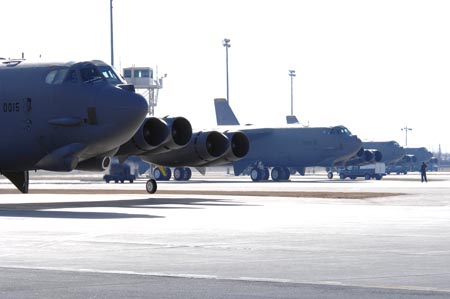The Air Force form ally activated Air Force Global Strike Command Provisional yesterday at Bolling AFB, D.C. The provisional command, a temporary unit led by Brig. Gen. James Kowalski, will take the lead in tackling the manpower and resource issues associated with standing up AFGSC, the new nuclear-focused major command that will oversee the service’s nuclear-capable bomber and ICBM operations. AFGSC(P) will also be involved in helping to identify the final location for the new command’s headquarters at a place other than Bolling. “There is an incredibly rich tradition of operational competency in this mission and our Air Force has done a lot of work to restore our focus on deterrence,” said Kowalski in a release. He added, “We look forward to laying the foundation needed to stand up Global Strike Command.” AFGSC(P) does not have any manpower authorizations, and USAF will inactivate it upon the standup—expected in September—of the permanent major command. Meanwhile, supporting it are detachments of subject matter experts that also began operations yesterday at the headquarters for Air Combat Command and Air Force Space Command at Langley AFB, Va., and Peterson AFB, Colo., respectively. These contingents, along with personnel from Air Force headquarters, will form a temporary HQ element of about 55 airmen for AFGSC(P) to help it develop the functional requirements for Air Force Global Strike Command. The provisional command will also work closely with the Air Staff’s strategic deterrence and nuclear integration office (A10), Air Force Materiel Command, and US Strategic Command to refine the roles and responsibilities of AFGSC.
ally activated Air Force Global Strike Command Provisional yesterday at Bolling AFB, D.C. The provisional command, a temporary unit led by Brig. Gen. James Kowalski, will take the lead in tackling the manpower and resource issues associated with standing up AFGSC, the new nuclear-focused major command that will oversee the service’s nuclear-capable bomber and ICBM operations. AFGSC(P) will also be involved in helping to identify the final location for the new command’s headquarters at a place other than Bolling. “There is an incredibly rich tradition of operational competency in this mission and our Air Force has done a lot of work to restore our focus on deterrence,” said Kowalski in a release. He added, “We look forward to laying the foundation needed to stand up Global Strike Command.” AFGSC(P) does not have any manpower authorizations, and USAF will inactivate it upon the standup—expected in September—of the permanent major command. Meanwhile, supporting it are detachments of subject matter experts that also began operations yesterday at the headquarters for Air Combat Command and Air Force Space Command at Langley AFB, Va., and Peterson AFB, Colo., respectively. These contingents, along with personnel from Air Force headquarters, will form a temporary HQ element of about 55 airmen for AFGSC(P) to help it develop the functional requirements for Air Force Global Strike Command. The provisional command will also work closely with the Air Staff’s strategic deterrence and nuclear integration office (A10), Air Force Materiel Command, and US Strategic Command to refine the roles and responsibilities of AFGSC.
Secretary of Defense Pete Hegseth visited the site of U.S. Space Command’s future home Dec. 12 and endorsed the move to establish the headquarters in Alabama after years of political back and forth.

